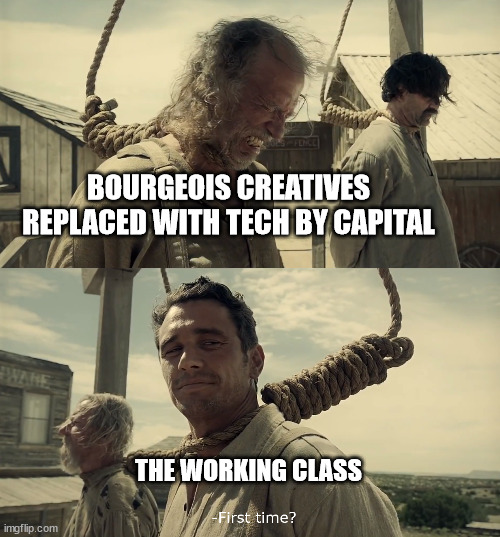this post was submitted on 28 Jan 2024
242 points (78.1% liked)
Political Memes
5601 readers
2503 users here now
Welcome to politcal memes!
These are our rules:
Be civil
Jokes are okay, but don’t intentionally harass or disturb any member of our community. Sexism, racism and bigotry are not allowed. Good faith argumentation only. No posts discouraging people to vote or shaming people for voting.
No misinformation
Don’t post any intentional misinformation. When asked by mods, provide sources for any claims you make.
Posts should be memes
Random pictures do not qualify as memes. Relevance to politics is required.
No bots, spam or self-promotion
Follow instance rules, ask for your bot to be allowed on this community.
founded 2 years ago
MODERATORS
you are viewing a single comment's thread
view the rest of the comments
view the rest of the comments

To further expand, the term bourgeoisie started because you used to have (all things in this reply simplified for conveniences' sake, there are nuances not discussed)
Either you owned everything as far as the eye could see, or you lived on that land and you were the property of the owner.
Then, as industrialization and/or global trade opened up, a new class emerged in the 1200s: "town dwellers" (literally what bourgeoisie means).
Now you had the aristocracy, peasants and people in between: they had money, property, a small amount of power and it wasn't necessarily acquired by birthright.
This is still hundreds of years ago, so still not a 1:1 for today.
Overtime, and after a bunch of revolutions, we end up at a situation where the bourgeoisie needs to split again: haute bourgeoisie and petit bourgeoisie (roughly 1800) The hautes are your corporate overlords, the petits are your guys who own one SME business and are successful at it. The haute don't labor, but invest, the petit don't labor but manage.
Today - You could also say haute are CxO, VP; petit are Director; then senior manager and down is just laborers
Between 1800 and end of WW2 the petit bourgeoisie split again: a new layer between laborer and petit: the middle class, this meant people who still worked jobs, still depended on selling the value of their labor, couldn't stop working on a whim, but were wealthy enough to achieve other markers of the bourgeoisie: property, leisure activities, vacations, travel, cars over horses (at first), more than one hat, inside plumbing...
Between WW2 and today there are much more layers, probably more akin to job titles and workplaces. "Retail workers" "Middle managers" "Blue collar tradesmen" - which aren't descriptions of their level in society but miniature microcosms of society and economy.
Some workers can be very rich without owning a business. Some can own their own business and be poorer than their employees. It's not so cut and dried any more.
All that to say, the "middle class" (in developed countries) both expanded and shrunk at the same time: the majority of people have a high quality of living with disposable income, but also can't retire now or maybe ever.
The line should always be - if you're under retirement age and quit your job tomorrow, do you have enough assets to comfortably live out the rest of your life with minimal changes to lifestyle until you die of old age?
As for the rest:
Are you worth more than 5 million dollars?
Do you and your partner combined earn more than $300,000 a year?
$150k?
$100k and below?
"Wow! 100k is a lot"
No, in the grand scheme of things in 2024, it is not.
To be fair, class isn't determined by income, but relation to the Means of Production, as classes have shared interests.